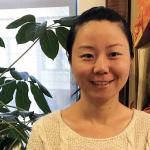
By Cathy Xiong, MƒA Master Teacher
The most recent MƒA Thursday Think event showcased Dr. Eugenia Cheng who was invited to speak about her recent book, The Art of Logic. In the book, Dr. Cheng uses mathematics to help us better understand the communication we have with others. There was an abundance of positive energy in the room as MƒA teachers, staff, and honored guests eagerly awaited her arrival.
Dr. Cheng is a renowned mathematician with a doctorate in Pure Mathematics from The University of Cambridge. Currently, she teaches Math to Art students at the School of the Art Institute of Chicago, where she utilizes articulated non-mathematical expressions to engage her students. Dr. Cheng simplifies mathematical relationships by making connections to society, the economy, and the political arena. She has both given talks and led workshops at MƒA in the past, and this fall she was the second speaker in the monthly MƒA Thursday Thinks series, held on the first Thursday of each month. The 2018-2019 speaker lineup features thought provoking talks from STEM experts, open to MƒA teachers, their colleagues, and the education public, who can connect with field experts and engage in meaningful dialogue.
During her presentation, Dr. Cheng provided many analogies using mathematics. She stressed the importance of breaking subject matter down to more rudimentary parts. She encouraged us to think through situations and emphasized interconnectedness, relationships, pivots, and intelligence. Dr. Cheng told us to view pure math as a tool – teaching us how to think and ultimately connect to the human world.
“Pure mathematics is a framework for agreeing on things...mathematics is a framework for thinking better, which is a productive way to have conversation."
- Dr. Eugenia Cheng
Dr. Cheng made the point that problems occur when people over complicate the solution-finding process. In giving real world examples, she stressed listening to ourselves and those around us. Consequently, Dr. Cheng led us on a straightforward journey, simplifying complex relationships and highlighting the interconnectedness of the world around us. She surmised that we can break free from the vicious cycle of poor decision-making by finding an "arrow that can be removed." Dr. Cheng illustrated this point by stating how, although "we can’t change feeling, we can stop our actions." Thus, she recommended making simpler choices as a means to attaining intelligence. In doing so, Dr. Cheng points to the logic found in interconnectedness.
Furthermore, Dr. Cheng challenged us to speak openly about relationships. She believes that to express ourselves, we need to resolve issues involving logic and emotion. Although the two subjects are far from related, Dr. Cheng emphasized that they are connected, that we need to first understand ourselves to truly understand the world.
Dr. Cheng’s talk also covered Cipolla’s Theory of Stupidity, which defines intelligence in terms of benefiting oneself and others. She suggested using logic and empathy at the same time to understand the world. Following Dr. Cheng's presentation, participants were able to pose questions which ranged from race, social class, and religion to how Dr. Cheng initiates conversations with her students and how to understand human nature using logic. Dr. Cheng encouraged shifting the conversation to relationships in many of her responses. She spoke about how logic and emotion must be distinguished in order to derive truth – and she pushed us to separate the two.
Dr. Eugenia Cheng is a brilliant scholar, prolific creator, and lauded contributor to humanity. In an increasingly complex world where very often answers lead to more questions, she urged us to look for perspective in simple facts and relationships instead of being bogged down by looking for a solution-seeking process. In essence Dr. Cheng implored us to pay attention to the trees instead of focusing on the forest. Although we may not be able to change the way we feel, she concluded that we can certainly create new realities based on our actions – and this is the pivotal force behind the art of logic and reason.
